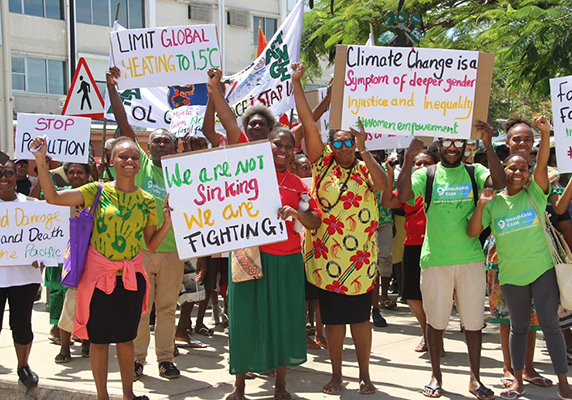A ruling in the International Court of Justice (ICJ) has highlighted Australia’s obligation to smaller nations affected by climate change and could open the country up to “significant liability risks” as a fossil fuel exporter.
In 2023, the United Nations (UN) General Assembly adopted a resolution which requested the advice of the ICJ on two specific questions.
In essence, these questions asked the court: what obligations states have in ensuring the protection of climate and environmental systems from greenhouse gas emissions under international law; and what legal consequences exist for states that cause significant harm to the climate system or environment.
As part of its ruling, the ICJ was asked to consider not only treaties specific to climate change, such as the 2015 Paris Agreement, but also legislation and agreed principles which take a more holistic view of the impacts of climate change – including the UN Convention on the Law of Sea and the Universal Declaration of Human Rights.
Ultimately, the court found the failure of states to take appropriate action to protect the climate from anthropogenic emissions could constitute an internationally wrongful act. This includes through fossil fuel production, consumption, the granting of fossil fuel exploration licenses, or the provision of fossil fuel subsidies.
These obligations also include a responsibility of the state to regulate the activities of private actors.

University of Melbourne lecturer in environmental law, Dr Liz Hicks, says the ICJ’s advisory opinion is important in creating an accountability mechanism for the role fossil fuel exports play in fuelling climate change.
“It makes it clear that the international obligations that bind Australia extend beyond the Paris Agreement,” Dr Hicks says.
“As one of the largest exporters in the world, this will open Australia up to significant liability risks.”
In response to the latter part of the General Assembly’s enquiry, the court found that states who breach the obligations outlined in the ruling may be liable to face “the entire panoply of legal consequences”.
“These include obligations of cessation and non-repetition, which are consequences that apply irrespective of the existence of harm, as well as the consequences requiring full reparation, including restitution, compensation and/or satisfaction,” the advisory opinion states.
This relates specifically to the obligations larger states have to smaller nations who are more vulnerable to the impacts of climate change, such as the Pacific Islands Nations who were key players in bringing the proceedings to the ICJ.
Australia’s obligation to our Pacific Island neighbours
The catalyst for this historic ruling came in 2019 from a group of 27 University of the South Pacific students.
Their campaign to persuade leaders of the Pacific Islands Forum (PIF) to take the issue of climate change to the ICJ culminated in 2022, when the 51st PIF Leaders Meeting endorsed the request for an advisory opinion from the international court.
Following this, the Vanuatu government led negotiations on a draft UN General Assembly resolution which was adopted in 2023.

In the advisory opinion ultimately handed down by the ICJ, the court was unanimous in its opinion that “states have obligations under international human rights law to respect and ensure the effective enjoyment of human rights by taking necessary measures to protect the climate system and other parts of the environment”.
“The Court thus concludes that, under international law, the human right to a clean, healthy and sustainable environment is essential for the enjoyment of other human rights,” the advisory opinion notes.
It also found that the adverse effects of climate change may impair this enjoyment, making the human rights of nations most affected by climate change the responsibility of all states.
This, according to Dr Hicks, will “open Australia up to a degree of liability risk to low lying islands, such as in the Pacific, for claims for harms that they experience”.
“These islands are particularly vulnerable to harms that will vary depending on small fractions of a degree of warming,” Dr Hicks says.
“On the other hand, Australia’s contribution to the climate problem through exports is disproportionately high.
“The [advisory opinion] made it clear that it is possible to attribute responsibility for harm to individual states even if it is difficult.”
What the ruling means for Australia’s fossil fuel exports
In the process of approving fossil fuel projects in Australia, whether or not to account for Scope 3 emissions is often a point of contention.
While Scope 1 and Scope 2 emissions are those produced on-site or as part of a project’s operations, Scope 3 emissions often occur downstream. In the case of coal and gas, these emissions are produced when the product is burned – primarily overseas.
There is no explicit legislation in Australia requiring these downstream emissions to be considered during the approval of fossil fuel projects.
An example of the contention around Scope 3 emissions is in a recently overturned coal mine extension within the Hunter Valley.
In 2022, MACH Energy was granted approval by the Independent Planning Commission (IPC) of NSW to extend the life of its Mount Pleasant operation for an additional 22 years – from 2026 to 2048.
This would result in the additional extraction of 247 million tonnes of coal.
The IPC noted in their decision that, under the Paris Agreement, Scope 3 emissions would be accounted for in consumer countries where the coal is burned.
This is the same justification used in the approval of projects such as the extension Woodside’s North West Shelf gas development to 2070, which the Australia Institute has estimated will contribute 4 billion tonnes of carbon dioxide equivalent in Scope 3 emissions.
Dr Hicks says that Australia’s role as one of the world’s largest fossil fuel exporters is the “bulk of our contribution to the climate harm”.
“Export heavy countries like Australia play a role in creating a market for fossil fuels,” Dr Hicks says.
“Our exports have played a role in fuelling Asian markets’ reliance on fossil fuels and the Future Gas Strategy, as well as recent Federal government decisions regarding extending gas development projects, indicate an intention to continue in that role.
“One of the challenges of the Paris Agreement was that it accounted for emissions at the point of consumption, rather than at the point of export.”
This is where the ICJ ruling may impact future fossil fuel project approvals in Australia.
In its ruling, the court noted that it had considered “the full range of human activities that contribute to climate change as a result of GHGs, including both consumption and production activities”.
“…the relevant conduct for the purposes of these advisory proceedings is not limited to conduct that, itself, directly results in GHG emissions, but rather comprises all actions or omissions of States which result in the climate system and other parts of the environment being adversely affected by anthropogenic GHG emissions,” the advisory opinion states.
During consideration of the General Assembly’s questions, participants were asked to outline their understanding of the obligations of fossil fuel-producing states.
Most agreed that obligations do not rest exclusively with consumers and end-users “but also include activities such as ongoing production, licensing and subsidizing of fossil fuels”.
The court also noted that while climate change is the result of cumulative GHG emissions, it is “scientifically possible to determine each state’s total contribution to global emissions”.
Dr Hicks says this is significant for Australia in that it recognises conduct from supply to consumption can be an internationally wrongful act
“Domestically, the advisory opinion could provide interpretative support for some areas of law that have been influenced by international norms, such as state human rights acts,” Dr Hicks says.
“International behaviour can be relevant to questions of fact, such as the calculation of carbon budgets or reasoning through causation. The wave of climate litigation that has emerged over recent years – including in Australia – really kicked off after the 2015 Paris Agreement made it easier to measure government conduct against stable standards.”
In the case of Mount Pleasant, community activist group Denman Aberdeen Muswellbrook Scone Health Environment Group (DAMSHEG) has since referred the approval to the Land and Environment Court (LEC) for review.
The DAMSHEG proceedings were dismissed by the primary LEC judge who found grounds for review had not been met.
In a landmark decision last month in the NSW Court of Appeal, DAMSHEG were successful in challenging the dismissal. The project’s approval will now again appear before the LEC.
DAMSHEG’s appeal is based around the contention that the IPC failed to consider whether conditions could be placed on the project’s Scope 3 emissions, as well as the likely environmental impacts of climate change on the local environment.
While this decision set a precedent for the consideration of Scope 3 emissions by the IPC, it was based on the impacts of climate change on the immediate geographic area around Mount Pleasant, required for assessment, rather than at a global scale.
However, the ICJ’s advisory opinion has the potential to influence similar cases and legislation in the future.
“As well as binding Australia under international law, the advisory opinion changes the international context in which Australian law is developing and the kinds of arguments that plaintiffs will bring before courts,” Dr Hicks says.




